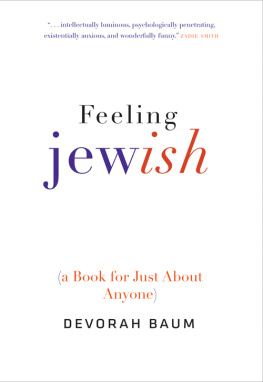Devorah Baum - Feeling Jewish
Here you can read online Devorah Baum - Feeling Jewish full text of the book (entire story) in english for free. Download pdf and epub, get meaning, cover and reviews about this ebook. publisher: Yale University Press, genre: Religion. Description of the work, (preface) as well as reviews are available. Best literature library LitArk.com created for fans of good reading and offers a wide selection of genres:
Romance novel
Science fiction
Adventure
Detective
Science
History
Home and family
Prose
Art
Politics
Computer
Non-fiction
Religion
Business
Children
Humor
Choose a favorite category and find really read worthwhile books. Enjoy immersion in the world of imagination, feel the emotions of the characters or learn something new for yourself, make an fascinating discovery.
- Book:Feeling Jewish
- Author:
- Publisher:Yale University Press
- Genre:
- Rating:4 / 5
- Favourites:Add to favourites
- Your mark:
- 80
- 1
- 2
- 3
- 4
- 5
Feeling Jewish: summary, description and annotation
We offer to read an annotation, description, summary or preface (depends on what the author of the book "Feeling Jewish" wrote himself). If you haven't found the necessary information about the book — write in the comments, we will try to find it.
Feeling Jewish — read online for free the complete book (whole text) full work
Below is the text of the book, divided by pages. System saving the place of the last page read, allows you to conveniently read the book "Feeling Jewish" online for free, without having to search again every time where you left off. Put a bookmark, and you can go to the page where you finished reading at any time.
Font size:
Interval:
Bookmark:
Feeling Jewish

Published with assistance from the foundation established in memory of
Philip Hamilton McMillan of the Class of 1894, Yale College.
Copyright 2017 by Devorah Baum.
All rights reserved.
This book may not be reproduced, in whole or in part, including illustrations,
in any form (beyond that copying permitted by Sections 107 and 108
of the U.S. Copyright Law and except by reviewers for the public press),
without written permission from the publishers.
Yale University Press books may be purchased in quantity for educational,
business, or promotional use. For information, please e-mail
(U.K. office).
Set in Janson Roman type by IDS Infotech, Ltd.
Printed in the United States of America.
Library of Congress Control Number: 2016958619
ISBN 978-0-300-21244-0 (hardcover : alk. paper)
A catalogue record for this book is available from the British Library.
This paper meets the requirements of ANSI/NISO Z39.48-1992
(Permanence of Paper).
10 9 8 7 6 5 4 3 2 1
For Shirley and Geoffrey, my parents
From the outside, youve always looked like an insider.
MATTHEW ALUN RAY , In the Absence of Human Beauty
Contents
Feeling Jewish
Introduction
How Are You?
If we truly knew which emotions we should have, we would no
longer feel like having any.
REI TERADA , Feeling in Theory
Theres a joke Jews sometimes like to tell about the moment when two non-Jews, Tom and Dick, bump into each other in the street:
TOM : How are you?
DICK : Fine, thanks.
Ha! Just imagine not being Jewish! Fine, thanks! What a blast!
What the jokes really about, of course, is Jewish fantasies of how social relations between gentiles must surely be. So breezy. So easy. Straightforward questions always answered positively, identities forever stable, no one even suspecting it might be otherwise. No one, that is, except the teller of a joke hinting at just such a suspicion... what if Tom and Dick are in fact hiding something? Does Tom really want to know how Dick is feeling? And does Dick really feel fine, or is fine his way of not sharing how he feels, or possibly his way of not having to feel anything at all? How are you? Fine. No feelings here. As if feelings, properly felt, threatened to undermine ones outward assurances, opening up an unwanted interrogation of the self.
Yet no one in their right mind genuinely expects the question to be taken literally. The exchange, How are you?Fine, writes Stephen Frosh, is a sophisticated social interaction, in which the first speaker expresses some fleeting recognition of the status of the other person as a human being, and the second speaker thanks them for this, indicates that the message has been understood, shows awareness of the social conventions that make interactions of this kind possible and proceeds with business. Affable but professional, thats how we keep things running smoothly. So while the question raises the possibility that there might be some other answer than the one habitually received, everyone knows that theres only one answer youre supposed to give. Someone who fails to understand that, who takes the question seriously every time its asked or uses the question as an opportunity for introspection, is a social irritanteither an outsider who has not yet learned the rules of civil discourse, or else shockingly self-involved.
I mention this somewhat shamefully knowing Im exactly the type of person to go to pieces when faced with how are you? Im a social irritant. So what is it about the most everyday of interactions that flusters me? Its not as though I dont know the script. Do I suspect that fine wont be deemed credible in my case? That no one will believe me? That the person asking the question already knows the answer better than I do? Or maybe its that I dont deem fine a credible response. Fine, thanks? In this world? You have to be kidding.
If its hard to give an honest account of ones own feelings, then it goes, or should go, without saying that no one can claim with any certainty to know what another person feels. Feelings seem an insurmountable border between ourselves and others. Although its equally true that our feelings are precisely what we can and do seek to share with others. Or even if we would rather not share, our feelings have a tendency to escape us. Feelings give us away, endlessly troubling the boundary between our private and public lives.
Since at least Aristotles day, however, it has been more customary to think of emotion as personal property; as that which not only belongs to but constitutes subjects as subjects. On this account, my feelings are mine and mine alone. As such, whenever I feel unsure of myself, or uncertain what to think, I need only check the pulse of my feelings to regain a sense of self-possession and composure. My feelings, seen this way, are a measure of myself. They authenticate me by telling me who I am, what I believe, and where I stand.
Such a view of emotion lends epistemological import to feelings. Feelings, it advises, are not to be ignored. Given how intimately embodied our feelings are, its easy to understand why such an idea of them should have taken hold. But do our feelings really offer us such self-assurance as the classical view implies? If so, then why do so many people seem to work so hard to avoid their feelings? And why is it that feelings are so often experienced ambivalently as those divisive and unsettling currents within our lives that can make us seem less rather than more knowable, or even strangers to ourselves? Its in opposition to the classical view of emotion, therefore, that Rei Terada has claimed that we would have no emotions if we were subjects. Not only, that is, do our emotions fail to guarantee our existence as unified selves, but they create a disturbance in us, a sense of instability. It is in this sense too that our feelings may fairly be described as movingeven if we dont always appreciate where it is they move us to.
Ugly Feelings
Certain people appear more readily moved than others. Such sensitivity has historically been accorded both positive and negative values. The eighteenth-century age of sensibility, for example, and its progression into the nineteenth-century era of romanticism, was a time when feelings were said to be so stirring, so terrifyingly sublime, as to get out of handyet this was also a period that yielded tropes and figures of fine feeling, whereby mans capacity for sentiment was considered proof and validation of his superiority over, among other things, the rise of the machines.
But being moved has not always been considered sublime, and not always considered fineor not, at least, fine for everyone. In Ugly Feelings Sianne Ngai describes a different age of sensibility, an age neither beautiful nor sublime, but more, in a word, machinic: that of the fully administered world of late modernity. Fine feelings thus turn ugly when the state of being moved implies not the subjects own agency but that of some external agent or puppet master pulling the stringsa grievous breach, therefore, to the conceit of emotional self-possession.
Feeling Odd
One of the first to give voice to the feelings permeating the fully administered world was Franz Kafka. When reading Kafka one confronts what it is to feel ashamed, guilty, self-hating, anxious, neurotic, paranoid, sexually hung up. One also confronts what it is to feel strange, feel funny, feel alienated from what Kafka may well have imagined to be natural feelings. Indeed, what Kafka seems to have felt most keenly was his own grotesque creatureliness in a prewar Europe whose rules, values, and norms were so prescriptive that feeling natural implied the natural confidence and propriety one might feel if one were correspondingly sure of ones identity, ones historical rootedness, ones position in the family and in society: the natural feelings of deference to ones father, of love for ones mother or wife, the natural feeling of wanting to become a parent oneselfthese were the affective relations that Kafka consistently condemned himself for failing
Next pageFont size:
Interval:
Bookmark:
Similar books «Feeling Jewish»
Look at similar books to Feeling Jewish. We have selected literature similar in name and meaning in the hope of providing readers with more options to find new, interesting, not yet read works.
Discussion, reviews of the book Feeling Jewish and just readers' own opinions. Leave your comments, write what you think about the work, its meaning or the main characters. Specify what exactly you liked and what you didn't like, and why you think so.













